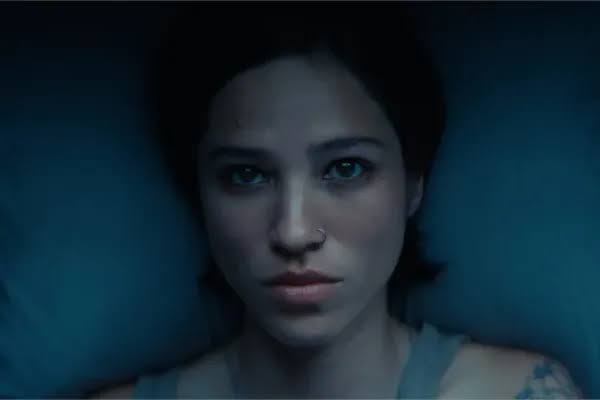Don’t Move Review: Netflix’s latest thriller, “Don’t Move,” takes an inventive, audacious concept — a young woman injected with a paralytic drug by a serial killer and left with minutes to escape — and aims to wring intense suspense and introspection out of it. Yet, while the film capitalizes on moments of nerve-wracking tension, it falls short of being more than a familiar genre exercise, lacking depth in character and story development.
In “Don’t Move” Kelsey Asbille plays Iris, a grieving mother haunted by the loss of her son in a tragic accident. Now on the edge of a cliff, quite literally contemplating ending her own life, she encounters a stranger, Richard, portrayed by Finn Wittrock, whose charming demeanor quickly unravels. After convincing her to step away from the edge, Richard reveals his own dark side, injecting Iris with a drug that slowly immobilizes her, and thus begins the torturous premise: a woman struggling against time and a deranged killer, forced to find the will to survive, even when she’d lost it moments before.
- Directors — Brian Netto, Adam Schindler
- Writers — T.J. Cimfel, David White
- Stream — Netflix
Don’t Move Review
The film’s premise is undeniably intriguing, centering around the paradox of a woman on the brink of suicide who suddenly finds herself fighting for her life. Yet, despite this strong foundation, the script, penned by TJ Cimfel and David White, never delves deeply into the psyche of its characters, especially Iris. In theory, Iris’ journey from despair to defiance could have been emotionally compelling, providing an opportunity for a powerful character study on grief, survival, and self-worth. However, “Don’t Move” opts for a more superficial exploration, giving only brief flashbacks of Iris’ life with her son and a vague sense of the grief driving her.
Instead, Iris is largely reduced to the physical manifestation of her pain — paralyzed, alone, and forced to communicate in silence for much of the film’s duration. Asbille delivers a strong performance within these limitations, conveying terror and determination through little more than eye movements and subtle muscle control. Her struggle is visceral, drawing the audience into her helplessness and desire to survive. But because the film’s script limits her to a backstory rooted solely in grief, we know little about Iris beyond this one dimension. This ultimately stunts the emotional weight of her journey, leaving her arc unfulfilled.

Don’t Move Cast
- Kelsey Asbille as Iris
- Finn Wittrock as Richard
- Moray Treadwell as Bill
- Daniel Francis as Dontrell
- Denis Kostadinov as Mateo
- Kate Nichols as Young Mom
- Skye Little Wing Dimov Saw as Boy (as Skye Dimova-Saw)
- Dylan Beam as Daughter
Effective Visuals and Suspenseful Moments, but a Lack of Consistency
Directors Adam Schindler and Brian Netto, who worked with producer Sam Raimi on the Quibi series 50 States of Fright, bring a well-executed visual style to Don’t Move. The camera’s tight focus on Iris’ face and her limited movements creates a sense of claustrophobia that mirrors her physical paralysis, and cinematographer Zach Kuperstein captures the beauty and isolation of the forest setting, which contributes to the film’s suspenseful atmosphere. The ticking clock effect, courtesy of the creeping paralysis, is intensified by a pulsating, tense sound design, which adds a visceral sense of urgency to each scene.
However, while certain sequences deliver genuine suspense, the film is uneven in its tension. Moments that should be gripping are frequently undercut by plot contrivances or underwhelming setups, weakening the viewer’s immersion. In particular, Iris’ repeated near-escapes feel more like plot devices than genuine narrative development. Supporting characters, including a well-meaning hermit and a police officer, come and go without adding meaningful complexity to the story, serving more as conveniences to advance Iris’ predicament than as fleshed-out elements of her world.
A Serial Killer with No Depth
Richard, the film’s antagonist, is presented as a calculating predator who uses manipulation and violence to maintain control. His introduction and “good Samaritan” facade initially promise an intriguing villain whose motivations may be as layered as Iris’ struggles. But as the plot progresses, it becomes clear that Richard is more a device of terror than a developed character. His backstory, as another grieving individual with a fixation on Iris, is only briefly hinted at and fails to provide the psychological depth or twisted logic that could make him a memorable antagonist.

Finn Wittrock’s performance is strong — shifting between friendly and menacing with ease — yet the character lacks the defining traits or motivations that might set him apart from other archetypal serial killers. Without this depth, Richard feels more like a placeholder, another version of the “killer in the woods” trope that audiences have seen before.
The Lost Potential of “Don’t Move’s” High Concept
The central concept of “Don’t Move” — a woman struggling to stay alive despite being physically incapacitated — echoes other successful high-stakes, single-location thrillers. Films like Buried, Phone Booth, and Locke have used minimalistic setups to maximize emotional and psychological impact, focusing intently on character depth and nuanced storytelling. The challenge with such a premise lies in balancing simplicity with complexity; unfortunately, “Don’t Move” falls short in this respect.
Instead of exploring Iris’ inner world or the psychological ramifications of her paralysis, the film frequently falls back on familiar genre tropes, emphasizing action and suspense over insight. Moments that could reveal Iris’ resilience, thoughts, or emotional conflict are instead replaced with predictable chase scenes and a few contrived confrontations. As a result, Don’t Move feels less like a character-driven thriller and more like an exercise in genre mechanics, where suspense and plot twists are prioritized over meaningful storytelling.

Conclusion
To the film’s credit, Don’t Move delivers an experience that, while lacking in depth, is watchable and suspenseful enough to satisfy fans of Netflix’s thriller offerings. At a brisk 92 minutes, it doesn’t overstay its welcome, and the pacing is steady enough to keep viewers engaged throughout. The chemistry between Asbille and Wittrock, despite the limitations of their roles, is compelling and makes the film’s few emotional beats feel authentic.

